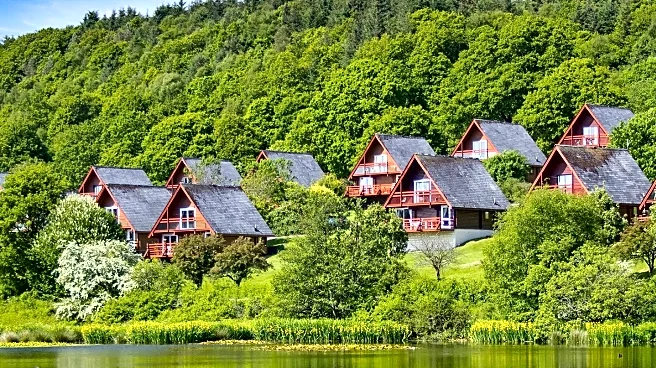What is the story about?
What's Happening?
As October approaches, many New Yorkers are looking to escape the city for a long weekend, trading the coastal Hamptons for the serene hiking trails and quaint towns of Upstate New York, particularly the Catskills. This region, located in the Hudson Valley, is renowned for its idyllic landscapes and is less than three hours from Manhattan. The Catskills offer a variety of accommodations, from modern inns with rustic charm to rugged lodges on expansive lands, and boutique bed and breakfasts. Vogue has curated a list of the best hotels in the Catskills, catering to different preferences for an upstate getaway. These hotels emphasize local, seasonal produce in their farm-to-table eateries and provide a retreat from the hustle and bustle of city life, with some areas even lacking cell service.
Why It's Important?
The Catskills have become a popular destination for New Yorkers seeking a break from urban life, offering a blend of natural beauty and stylish accommodations. This trend highlights a growing interest in domestic travel and the appeal of rural retreats that offer tranquility and a connection to nature. The emphasis on local produce and sustainable practices in the hospitality industry reflects broader societal shifts towards environmental consciousness and support for local economies. As more people seek these experiences, the Catskills could see increased tourism, benefiting local businesses and communities.
What's Next?
With the increasing popularity of the Catskills as a travel destination, local businesses and hospitality providers may continue to expand and innovate to meet the demands of visitors. This could include more eco-friendly accommodations, enhanced outdoor activities, and partnerships with local farms and artisans. As the trend of seeking rural retreats grows, other regions may also look to capitalize on this interest, potentially leading to a broader shift in travel patterns and preferences.
Beyond the Headlines
The rise in popularity of the Catskills as a travel destination may also influence cultural perceptions of rural areas, highlighting their value as places of relaxation and rejuvenation. This could lead to increased investment in infrastructure and services in these regions, improving quality of life for residents and enhancing the visitor experience. Additionally, the focus on sustainability and local produce in the hospitality industry may encourage other sectors to adopt similar practices, contributing to broader environmental and economic benefits.
















